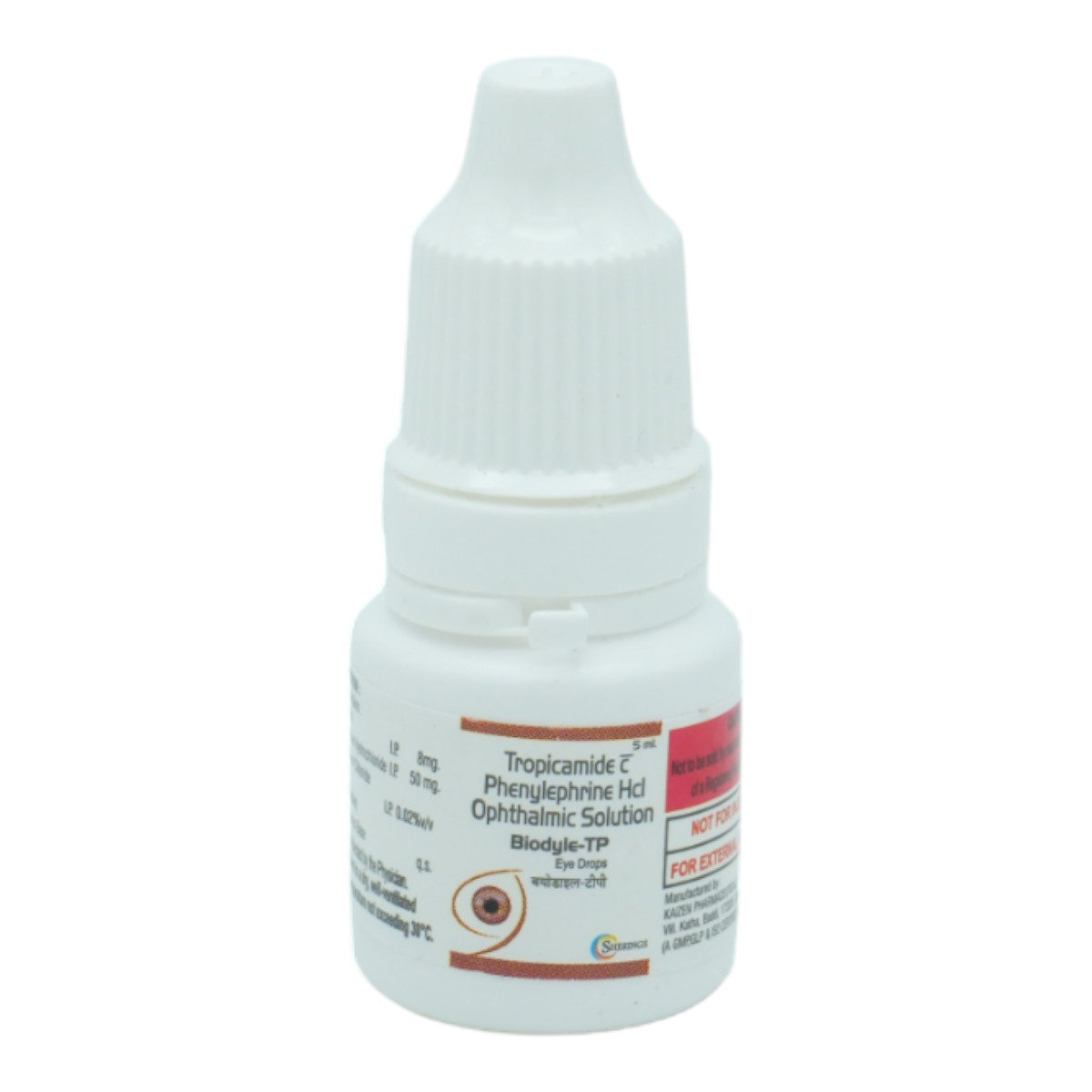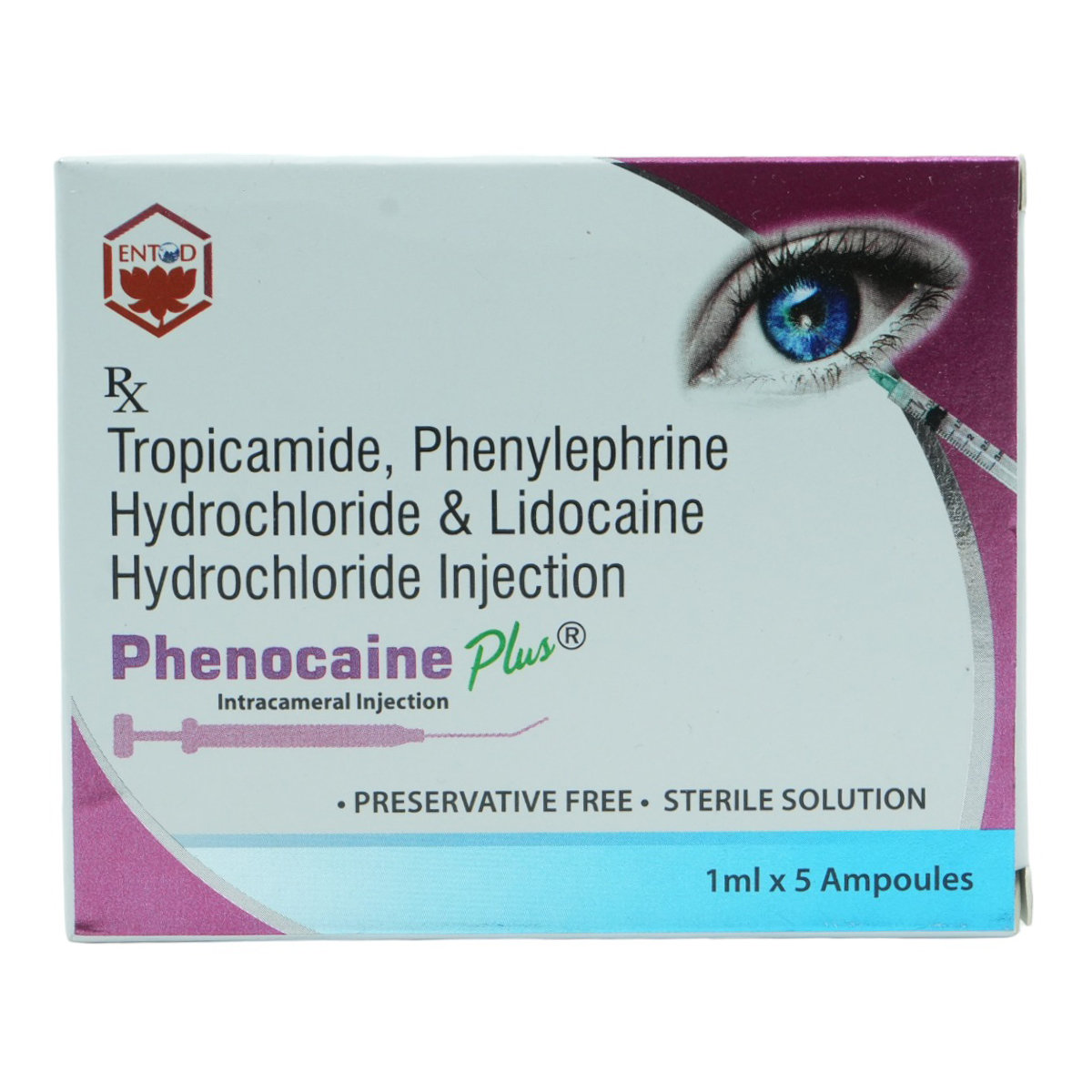Tropicamide+phenylephrine
About Tropicamide+phenylephrine
Tropicamide+phenylephrine belongs to the class of medications called ‘Ophthalmic agents’ used for examining the eye during the diagnosis or detection of any eye disease, or therapeutic procedures. It can help detect eye inflammation or any other eye diseases such as uveitis (inflammation of the middle layer of the eyewall) or in ophthalmoscopy procedures (retinal examination) or during eye surgeries.
Tropicamide+phenylephrine is a combination of two medicines: Tropicamide and Phenylephrine. Tropicamide is an anticholinergic, while Phenylephrine is a decongestant. They work by making the pupil of your eye larger and relaxing the muscles in your eye. This allows proper examination of the inside of your eye.
Tropicamide+phenylephrine is for external use only. You should take this medicine as prescribed by your doctor. The common side-effects of Tropicamide+phenylephrine are headache, dizziness, blurred vision, photophobia (sensitivity to light), eye pain, eye irritation, burning or stinging sensation in the eye, skin rash, hypotension (low blood pressure) and nausea (feeling sick). Inform your doctor if any of these side-effects persist or get worsen.
Do not take Tropicamide+phenylephrine if you are allergic to Tropicamide, Phenylephrine or any contents of it. Before taking Tropicamide+phenylephrine, inform your doctor if you have glaucoma (increased pressure in the eye), heart diseases, hypertension (high blood pressure), hormonal disorders, thyroid problems, diabetes and tachycardia (increased heart rate). Inform your doctor if you are pregnant or breastfeeding before starting Tropicamide+phenylephrine. It should not be used in children below 1 year.
Uses of Tropicamide+phenylephrine
Medicinal Benefits
Tropicamide+phenylephrine is a combination of two medicines: Tropicamide and Phenylephrine. Tropicamide is an anticholinergic, while Phenylephrine is a decongestant. They work by making the pupil of your eye larger and relaxing the muscles in your eye. This allows proper examination of the inside of your eye.
Directions for Use
- Follow your doctor's instructions on the dosage and timing of this medication.
- Tilt the head back, pull down the lower eyelid, and squeeze the prescribed number of drops. Close your eyes for 1-2 minutes.
- Do not touch the container tip to the eye, eyelids, or surrounding areas to prevent contamination.
- Tropicamide+phenylephrine is only for opthalmic use.
Storage
Side Effects of Tropicamide+phenylephrine
- Headache
- Dizziness
- Blurred vision
- Photophobia (sensitivity to light)
- Eye pain
- Eye irritation
- Burning or stinging sensation in the eye
- Skin rash
- Hypotension (low blood pressure)
- Nausea (feeling sick)
Drug Warnings
Tropicamide+phenylephrine may increase pressure inside the eye, so it should not be used in patients with glaucoma. It is advised to remove contact lenses at least 15 minutes before instilling Tropicamide+phenylephrine drops as it may eye irritation. Tropicamide+phenylephrine should be used with caution in patients with eye inflammation. Tropicamide+phenylephrine is also used with extreme caution in children, especially with Down syndrome and brain damage as there is an increased risk of side-effects associated with the nervous system.
Drug Interactions
Drug-Drug Interaction: Tropicamide+phenylephrine may interact with a medicine used to treat low heart rate (atropine), antihypertensive agents, antidepressants (isocarboxazid, linezolid, selegiline, rasagiline, phenelzine, and tranylcypromine, etc.), anti-arrhythmic drug (quinidine), and general anaesthetic (halothane).
Drug-Food Interaction: No interactions found.
Drug-Disease Interaction: Tropicamide+phenylephrine should be used with caution in patients with glaucoma (increased pressure in the eye), heart diseases, hypertension (high blood pressure), blood clots, hormonal disorders, thyroid problems, diabetes, and tachycardia (increased heart rate).
Drug-Drug Interactions Checker List:
Safety Advice

Alcohol
cautionAlcohol may interfere with the action of Tropicamide+phenylephrine. Hence please limit/avoid taking alcohol while being treated with Tropicamide+phenylephrine.

Pregnancy
cautionWhen clinically needed, Tropicamide+phenylephrine is given by a doctor to pregnant women after doing a risk/benefit assessment. Please consult your doctor before using Tropicamide+phenylephrine if you are pregnant or planning to conceive.

Breast Feeding
cautionPlease consult your doctor before using Tropicamide+phenylephrine if you are breastfeeding.

Driving
cautionTropicamide+phenylephrine may cause blurred vision. So, avoid driving or operating heavy machinery until your vision is clear.

Liver
safe if prescribedTropicamide+phenylephrine can be given safely to patients with liver diseases when prescribed.

Kidney
safe if prescribedTropicamide+phenylephrine can be given safely to patients with kidney diseases when prescribed.

Children
cautionTropicamide+phenylephrine should be used with caution in children with heart and neurological diseases. It is not recommended for use in children less than 1 year of age.
Habit Forming
Diet & Lifestyle Advise
- Sleep for at least six to eight hours to rejuvenate your eyes naturally.
- Wash your eyes with clean water at least two to three times a day
- Manage stress, eat healthily, drink plenty of water, exercise regularly and get plenty of sleep.
- Avoid alcoholic beverages as it can make you dehydrated and affect your sleep. This effect can also affect your body’s ability in fighting off infections.
- Reduce screen time (by avoiding watching tv, or phone) and use sunglasses while going out into the sunlight.
Special Advise
Your doctor may advice an eye examination to check for glaucoma before giving Tropicamide+phenylephrine in patients with history of glaucoma or family history of glaucoma.
Patients Concern
Disease/Condition Glossary
Eye diseases: Eye diseases are of a wide variety ranging from minor eye problems that don't last long such as conjunctivitis (pink eye) and major conditions that can lead to blindness such as glaucoma (increased pressure in the eye). Some examples of eye diseases that require diagnostic procedures are refractive errors (near-sightedness and farsightedness), cataracts (clouding of the eye), and glaucoma. The risk of eye diseases is high in older people and patients with diabetes.
FAQs
Tropicamide+phenylephrine is used for examining the eye during the diagnosis or detection of any eye disease, or therapeutic procedures. It can help detect eye inflammation or any other eye diseases such as uveitis (inflammation of the middle layer of the eyewall) or in ophthalmoscopy procedures (retinal examination) or during eye surgeries.
Tropicamide+phenylephrine is a combination of two medicines: Tropicamide and Phenylephrine. It can cause mydriasis (dilation of the pupil of the eye) to help the doctor to visualize the eye clearly for detection of any eye diseases.
Remove contact lenses at least 15 minutes before using Tropicamide+phenylephrine as it causes eye irritation. Tropicamide+phenylephrine may cause photophobia (sensitivity to light), so wear sunglasses if you experience sensitivity to light after using this medicine. Tropicamide+phenylephrine may also cause blurred vision, so avoid driving or operating heavy machinery until your vision becomes normal.
Tropicamide+phenylephrine acts or causes dilation of the pupil within minutes after instilling the drops. Its effect may last up to few hours to one day.
Tropicamide+phenylephrine should not be used in patients with glaucoma as Tropicamide+phenylephrine may increase pressure inside the eye.
Tropicamide+phenylephrine may cause blurred vision or other eye problems such as pain or irritation. However, these effects are temporary and resolve within a few hours. Discuss with your doctor the possible risks associated with Tropicamide+phenylephrine before using this medicine.





